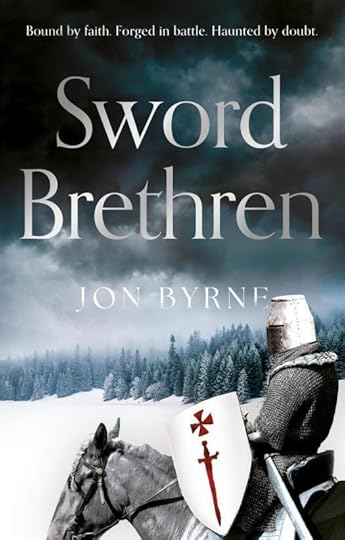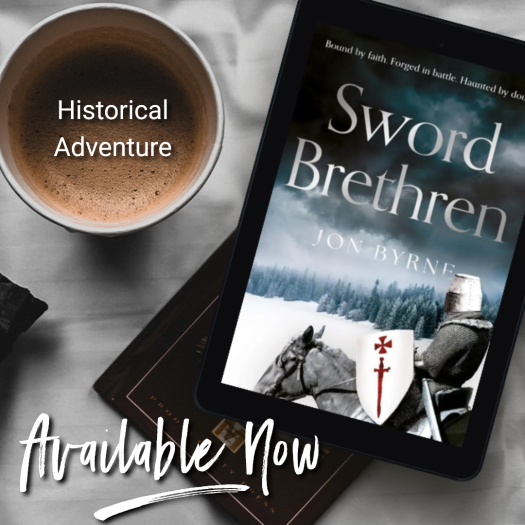[Guest Post]: The most common mistakes in writing historical fiction by Jon Byrne, author of “Sword Brethren”
In August, I hosted Jon Byrne and his historical adventure “Sword Brethren” . I picked this book because of its references to Prince Alexander Nevsky of Novgorod, a prominent figure in Russian history and a saint of Russian Orthodox church. Alexander Nevsky rose to power and got a legendary status after his victories over Swedish knights in the battle on the river Neva. Hence, the title “Nevsky”.
In his guest post, Jon Byrne discusses the most common mistakes in writing historical fiction and how to avoid them, and reflects on research he’s done, writing the novel. I hope you’ll find his article as fascinating as I do.
Guest Post
Historical fiction can be one of the most rewarding genres – for writers and readers alike. When done well, it can transport us to another era, letting us walk the streets of a medieval town, sit at the table of a Roman senator, or march alongside soldiers of the Great War. But for writers, it can be tricky ground, and there are a few common mistakes that can pull a reader right back out of the past.
One of the biggest traps is overloading the book with research. Of course, writers need to know the history to write convincingly, but there’s a fine line between enriching a scene and drowning it in unnecessary detail. Readers don’t want a textbook – they want a story, and historical details should serve that story, without turning every paragraph into a history lecture.
Another problem is giving characters attitudes that don’t fit their time. It’s tempting to let a medieval knight sound like a modern social activist or to have a Victorian heroine roll her eyes at social conventions in ways that just wouldn’t have happened. It might make a character more relatable at first glance, but it often ends up breaking immersion. The challenge is to create characters we can connect with while still letting them belong to their world.
Worldbuilding is another area where writers can stumble. Throwing in a few old-fashioned words or costumes doesn’t create a convincing past. But historical fiction thrives on atmosphere: smells, textures, sounds, and the unspoken social rules of the time. When those details are missing, the setting feels like a stage backdrop instead of a living world.
And of course, there’s the temptation to focus so much on big events – wars, kings, political intrigue – that the smaller realities of life get overlooked. Readers want to see those, too, because they make history feel real and personal. Neglecting these details risks making the world feel hollow.
Accuracy matters, too. I relied heavily on the principal first-hand source, The Chronicle of Henry of Livonia, which was written by a priest, Henricus des Lettis, probably around 1229. The chronicle deals with events in the eastern Baltic between 1180 to 1226. His chronicle is a highly detailed account, rich in human history, and he provides eye-witness testimony of the events at this time, depicting not only the military campaigns but interesting facts about the local people themselves. It is not always necessary to get every obscure fact perfect, but if a story set in the 13th century has people eating potatoes or using minutes and seconds for telling the time of day, readers will notice. A few mistakes like that can undo a lot of the atmosphere.
Above all, it’s worth remembering that history is the backdrop, not the star of the show. At the heart of every great historical novel are strong characters and a gripping story. The past might set the stage, but it’s the people who make readers care enough to keep turning the pages.

About the Book

Genre: Historical Adventure
Date Published: 28th November 2024
Publisher: The Book Guild
1242. Wounded and captured after the Battle on the Ice, English knight Richard Fitz Simon becomes the unlikely guest of Prince Alexander Nevsky of Novgorod. Curious about his prisoner, Alexander commands his scholar to record Richard’s tale.
Richard’s story begins in 1203, when betrayal shatters his path to knighthood and drives him from England to the merchant city of Lübeck. There, entangled in an illicit affair and the cutthroat salt trade, he finds only temporary refuge. Fleeing once again, he joins the Livonian Brothers of the Sword—a militant order sworn to spread Christendom across the pagan Baltic.
Amid the cold austerity of Riga’s commandery and the looming threat of enemy tribes, Richard must battle not just for survival, but for meaning in a life shaped by violence, doubt, and fractured loyalties. When a pagan army threatens to overrun their outpost, he faces a final reckoning—one that will test his faith, his honor, and the limits of his courage.

About the Author
 Jon Byrne, originally from London, now lives with his German family by a lake in Bavaria with stunning views of the Alps. As well as writing, he works as a translator for a local IT company and occasionally as a lumberjack.
Jon Byrne, originally from London, now lives with his German family by a lake in Bavaria with stunning views of the Alps. As well as writing, he works as a translator for a local IT company and occasionally as a lumberjack.He has always been fascinated by history and has studied the Medieval world for over twenty years, building up a comprehensive library of books. Sword Brethren (formerly Brothers of the Sword) made it to the shortlist of the Yeovil Literary Prize 2022 and the longlist of the prestigious Grindstone International Novel Prize 2022. It is the first book in The Northern Crusader Chronicles.
Contact Links
Website: https://www.jonbyrnewriter.com/
Facebook: https://www.facebook.com/JonByrneAuthor/
Goodreads: https://www.goodreads.com/book/show/220324455-sword-brethren
Purchase Links:
Amazon:
Barnes and Noble:
https://www.barnesandnoble.com/w/sword-brethren-jon-byrne/1146519606?ean=2940184429601
Kobo:
https://www.kobo.com/gb/en/ebook/sword-brethren
iBooks:
Google Play:
https://play.google.com/store/books/details/Jon_Byrne_Sword_Brethren?id=-2ovEQAAQBAJ&pli=1
L. Salt's Blog
- L. Salt's profile
- 139 followers



